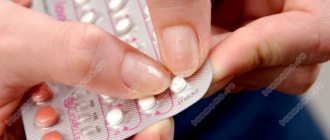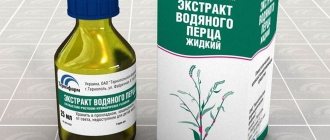Why are periods heavy?
Over many years of research, norms for the amount of discharge per day have been established. Blood loss of up to 80 ml per day is considered normal, and up to 200 ml during menstruation. If the volume exceeds the specified norm, this is already considered heavy periods and refers to menstruation disorders. Heavy periods are also called menorrhagia or hypermenorrhea. This condition may be explained by the presence of some diseases in the woman’s body. Menorrhagia often occurs for the following reasons:
- Hormonal imbalance - due to an excess of estrogen, the uterine mucosa thickens. This may cause heavier bleeding during menstruation;
- Dysfunction of the ovaries - when the process of ovulation does not occur, that is, the egg does not leave the ovary, due to a lack of progesterone in the body;
- Abortion or miscarriage - in such situations the cause is a hormonal disorder. Improper cleaning of the uterus may also affect it and parts of the placenta remain in it;
- Uterine polyps are small benign growths that form in the uterus. May affect the amount of bleeding;
- Uterine fibroids are a fairly common problem among women. This is a benign tumor that forms in the muscle layer of the uterus. Formations can be of different sizes and numbers;
- Endometrial hyperplasia is thickening of the endometrium of the uterus. May cause heavy blood loss, sometimes with blood clots;
- Adenomyosis is when the endometrium of the uterus grows inside the muscular layer of the uterus. In this case, inflammatory processes may occur;
- Postpartum recovery – many women experience changes in their menstrual cycle after having a baby, and the amount of discharge may increase;
- Use of an intrauterine device.
Causes of heavy periods
The cause can also be diseases of other body systems: kidney disease, thyroid disease, liver disease, oncology, disorders in the process of blood clotting.
When is it necessary to restore blood?
Blood loss may not only occur due to physical damage, such as visible cuts in the skin. There are also a number of other reasons that are worth considering before moving on to the next point.
Thus, it is necessary to restore blood:
- During menstruation. As you know, this is the appearance of bloody discharge from the genital tract every month. It is a feature of only the female body and affects the physiological state.
- After childbirth. During the birth of a new person, blood loss is inevitable. The normal average amount of blood lost by a woman during childbirth is up to 300 ml.
- When a large blood vessel ruptures. This can be caused by injury to the surface of the body.
- In some diseases of the body , during which blood loss occurs, for example, colon cancer, is accompanied by bleeding from the anus.
- After donation. People who donate need to replace blood loss after each donation.
- After some operations associated with large blood loss.
How to understand that menstruation is too heavy
Hypermenorrhea is characterized by fairly heavy bleeding. At the same time, a pad or tampon is replaced almost every hour. You can use up to 7 pads during the day. Daily blood loss can be more than 80 ml. Menstruation itself lasts more than 7 days. Blood clots may be present in the discharge, sometimes in large quantities.
Very heavy periods can be accompanied by severe cramps and pain.
Due to the large amount of blood discharge in the blood itself, the amount of hemoglobin and red blood cells may decrease. This can lead to general changes in the body:
- increased fatigue,
- dizziness,
- pale skin,
- nausea,
- disorders of the digestive system.
For all these symptoms, matkahelp ru recommends contacting a gynecologist, and the sooner the better.
Number of menstrual flows per hour
Bleeding from the genital tract in the postpartum period
Postpartum discharge is a natural phenomenon; the body cleanses itself. Their duration should not exceed 8 weeks. Otherwise, you need to contact specialists.
A gynecologist may suspect the development of pathological processes if the following symptoms are present:
- pronounced unpleasant odor of discharge;
- excessive bleeding, changing the pad every hour;
- at the same time, severe weakness, dizziness are felt, blood pressure drops sharply;
- There are no clots, the discharge is watery.
Heavy periods - what to do at home
Often you can improve your condition with simple actions:
- Peace
Try to reduce physical activity. If possible, lie down more and move less. Movement can increase uterine contractions, thereby increasing the volume of discharge.
- Warm
Never use a hot heating pad on your stomach. Heat can only make bleeding worse. Also, during menstruation, avoid hot baths and saunas. It's better to take a warm shower. In the summer, try not to be in the open sun, stay more in cool rooms. When the body overheats, blood circulation in the organs accelerates and the release of blood during menstruation may increase.
- Diet
With hypermenorrhea, it is imperative to monitor your diet. Drink more fluid. This will replenish your blood volume and prevent dehydration. Avoid alcohol and drinks containing caffeine. It increases contraction of the uterine walls. Do not eat fatty foods.
Include foods rich in vitamins C and P in your diet. These include citrus fruits, bell peppers, and pineapple. Eat foods rich in iron: liver, beef, fish, dried apricots, white beans. This will help prevent anemia.
To prevent heavy periods, Ascorutin is used.
Errors during menstruation
There are certain mistakes women make that can contribute to disruptions in the menstrual cycle.
During critical days you cannot:
- Exercise. Even minor physical activity can negatively affect increased blood flow in the pelvic organs. The consequence is bleeding. Intense exercise in the first two days of menstruation is especially dangerous.
- Complete bed rest. You shouldn’t go from one extreme to another by spending these few days in bed. A state of absolute rest can cause blood stagnation and increased pain.
- Taking a bath and other ways to overheat the body. With strong vasodilatation and increased blood circulation, bleeding may occur.
- Maintaining an active sex life. According to most experts, it is better to refuse intimacy these days.
- Wrong diet, strict diet. An unbalanced diet causes vitamin deficiency, and this negatively affects the condition of all internal organs, the level of hemoglobin decreases, and there is a risk of bleeding.
- Alcoholic drinks. Doctors say it is better to refrain from drinking alcohol during this period.
- Use tampons exclusively for hygienic purposes. Failure to maintain personal hygiene when changing tampons or pads.
How to stop heavy periods with fibroids
Myoma is a benign tumor. But it is still a pathology and can cause bleeding. If such a situation arises, it is better to call an ambulance and be hospitalized, as there is a risk of blood loss. In a medical institution, a doctor will be able to determine the complexity of the situation and take the necessary measures. First of all, hemostatic drugs will be prescribed.
To slightly reduce bleeding until the ambulance arrives, take a horizontal position with your legs elevated. Apply cold to your stomach (hold for 10 minutes, then remove for 5 minutes, then do it again).
How to stop heavy periods during menopause
Menopause is a period when reproductive function gradually ceases in mature women. In this case, there may not be periods as such. But if, upon the onset of menopause, heavy bleeding occurs, this may indicate pathology in the reproductive system. If heavy bleeding occurs, lie on your back, elevate your legs, and place a cold pack on your stomach.
With such a problem, Matkahelp ru recommends immediately consulting with a gynecologist.
How to stop heavy periods with endometriosis
This pathology develops in women aged 25-45 years. And it can affect not only the uterus, but also the ovaries, fallopian tubes, vagina, and can even be observed in the bladder. This problem can be eliminated either by taking contraceptives or by surgery (curettage).
Endometriosis is accompanied by severe pain, so painkillers can be used at home. But in no case should you use hemostatic agents - this can only lead to negative consequences and aggravate the problem. Therefore, it is better to immediately contact a gynecologist.
Use medications only under the supervision of a specialist
Ways to treat heavy period bleeding
The treatment prescribed in each individual case is different, it is determined by the characteristics of the body, the main factor in the development of pathology:
- To stop bleeding, special medications are prescribed.
- The use of hormonal drugs is indicated.
- Women who have given birth may be prescribed surgical cleaning.
- Taking immunostimulants and vitamin preparations.
- Sedative drugs.
- Drugs to restore hormonal balance.
- Drugs to stop bleeding.
How to stop a teenager's heavy periods
The problem with menstrual irregularities in girls occurs between the ages of 12 and 16 years. The causes may be infectious diseases, unhealthy diet, hormonal disorders, physical or psychological stress. You can eliminate the problem with menstruation in teenagers with the help of:
- Physiotherapy;
- Use of drugs containing iron;
- Psychotherapy if there are problems with the child’s psychological state;
- Diets.
Traditional medicine can also be used: decoctions of nettle herbs, corn silk, and yarrow. They will help increase blood clotting and slightly reduce the volume of secretions. But before use, it is better to consult a pediatric gynecologist. Hormonal drugs are prescribed to adolescents very rarely.
Pills that stop heavy periods
For hypermenorrhea, both pharmaceutical drugs and traditional medicine are used. Pharmaceutical drugs include:
- Tranexam is now the first drug that can be used to stop heavy periods. It is used to reduce bleeding of varying degrees. Take the drug only under the supervision of a specialist;
- Dicinone - does not particularly affect blood clotting; the desired effect occurs after 3 hours. For severe bleeding, it is used every 5-6 hours. Better results after intravenous administration;
- Vikasol - replaces vitamin K, which affects blood clotting. But it is not advisable for use at home - there are many side effects. Therefore, it is better to do this under medical supervision;
- Calcium gluconate, calcium chloride – has a positive effect on blood clotting by reducing vascular permeability;
- Ascorutin - contains vitamin C and P, which well restore the walls of blood vessels and thereby reduce its permeability. But in order to reduce bleeding, it does not work so quickly. The drug is used more for prevention purposes;
- Hormonal drugs – this includes more contraceptives. They will help with hormonal imbalances, but you won’t be able to quickly get rid of heavy discharge right away. Drugs such as Femoden, Rigevidon, Marvelon may be prescribed.
- Antispasmodics, pain relievers - such drugs include No-shpu, Solpadein, Ibuprofen, Paracetamol. But you need to remember that they will help reduce spasms and remove pain, but will not affect the cause and will not reduce blood loss.
This is how the hog uterus blooms - a folk remedy for blood loss during menstruation
Medicines for heavy bleeding during menstruation
It is important to remember that any medications should be prescribed only by a doctor. The following tools are commonly used:
- dicinone;
- calcium gluconate;
- ascorutin.
Such drugs are used for mild symptoms. In case of severe bleeding during menstruation, medications are administered by injection:
- vikasol;
- dicinone;
- tranexam.
Typically, with serious bleeding, the patient must be hospitalized and treated in a hospital. Oral contraceptives, hemostatic drugs, and Oxytocin are also prescribed for rapid contraction of the uterine walls. It is imperative to prescribe medications containing iron, with which you can restore hemoglobin and prevent the development of serious anemia.
Folk remedies
For those who do not really welcome pharmaceutical drugs, you can use traditional medicine. Herbal decoctions are often used:
- Nettle – rich in vitamin K and vitamin C, iron. If I’m thinking about how to stop heavy periods using folk remedies, then first I suggest nettle. The most important effect of this herb is aimed at blood clotting. 1 tablespoon of dried nettle leaves per 200 ml of boiling water. Cook for 5-7 minutes over low heat, leave to brew for 30 minutes. Strain through cheesecloth, you can add 200 ml of boiled water. Drink half a glass 3-5 times a day for no more than 3 days. You can purchase ready-made nettle tinctures in pharmacies;
- Borovaya uterus - its properties are similar to the action of hormones. Well used to reduce blood loss during menstruation. There are ready-made tinctures of boron uterus in the pharmacy, but you can make a decoction at home: pour 1 tablespoon into 200 ml of water and cook for 20 minutes. Cool, strain and drink 1 tablespoon 3 times a day;
- Water pepper – accelerates blood clotting. Helps reduce the amount of discharge during menstruation. Pour 1 tablespoon of herb into 1 glass of boiling water and let it brew for 1 hour. Take 1 tablespoon in the morning before breakfast. You can also purchase a ready-made tincture of water pepper at the pharmacy;
- Cloves – has astringent and hemostatic properties. Pour one tablespoon with 1 glass of boiling water and leave to steep for about 2 hours. Strain and drink 1 tablespoon 3 times a day;
- Cinnamon - a drink made from this spice is very good for heavy bleeding. It’s quite easy to make: pour 1 tablespoon of powder into a glass of warm water and drink every half hour;
- Corn silk - this decoction is effective for heavy discharge. 1 tablespoon is poured into 1 glass of boiling water, let it brew for at least 1 hour. Take 1 tablespoon 3 times a day before meals.
It is very important to identify in time the cause of heavy blood loss during menstruation. All traditional and alternative medicine are good for stopping bleeding when your periods are too heavy, but you need to take into account the fact that they will only help relieve symptoms, alleviate pain and reduce the amount of discharge. But the problem can be solved and the cause can only be eliminated with the help of specialists and a series of examinations. After all, heavy periods are just a symptom. Therefore, matkahelp.ru advises not to self-medicate, but at the first suspicion, immediately contact a gynecologist in order to avoid negative consequences.
Other methods
Along with generally accepted means of treatment, we must not forget about the methods of alternative medicine. They also have a beneficial effect on the human body. Here are those that help restore the resource we need:
- Cleansing the body with water and honey. Water flushes out toxins and waste, cleans blood vessels, and reduces blood cholesterol levels. Honey strengthens blood vessels and prevents the formation of blood clots.
- Thalassotherapy. Treatment using marine natural resources. Sea water in its chemical structure is close to the composition of human blood. It is very useful to take salt baths and breathe sea air.
- Hirudotherapy. Treatment with leeches accelerates blood circulation, saturates blood cells with oxygen and renews it.










